Gavin Cooney
Staff Writer
If a week is a long time in football, then nine and a half years must seem like a generation. This week, however, those who bring the above cliché to the table, as it were, were reminded of a distant past. Cristiano Ronaldo shed tears upon accepting the Ballon D’Or award last week, an award that recognised him as the greatest footballer of 2013. Spanish football daily Marca described them as ‘tears of gold’. It was not the first time Ronaldo has cried in public. After losing the Euro 2004 final to Greece in home soil, the world saw Portugal’s precocious attacker reduced to an anguished and wailing wreck after the final whistle. Then Ronaldo was merely a talent. An extraordinary talent, but had yet to achieve what he could and subsequently did.
On that pitch in the summer of 2004, the sobbing Ronaldo aesthetically captured most of the stereotypes held against him. The tears met favourably with the caricature of a petulant child playing a man’s game. The bandaged earrings with the accusation that he was a person that cared as much about his appearance as anything else. It was easy to forsee him failing to make the most of his talents. Here was an outrageously talented teenager with a big ego and an even bigger bank balance.
Since losing the European Championship Final, Ronaldo has won the Champions League, three Premier League titles, two English League Cups, one FA Cup, one La Liga title and one Copa Del Ray. He has played 196 times for Manchester United, scoring 84 times. For Real Madrid, he has a scarcely believable 166 goals in 153 games. Ronaldo, far from falling victim to the magical rewards of a career as a professional footballer, has redefined what a professional footballing career is. He has shaped the profession as much as it has shaped him. Ronaldo, along with Lionel Messi, has turned the improbable into a weekly spectacle. A willing suspension of disbelief is probably the best method to use to put Ronaldo’s achievements into context. While pitches today suit attacking players, defences have never been so well organised, opposition players have never been so athletic and disciplined. Yet Ronaldo has averaged more than a goal a game in the past two years. Ronaldo’s phenomenal achievements are a victory for self-determination and belief.
“Ronaldo shed tears upon accepting the Ballon D’Or award last week, an award that recognised him as the greatest footballer of 2013. Spanish football daily Marca described them as ‘tears of gold’.”
Early in his Manchester United days, Ronaldo declared his ambition to become the best football in the world. Since then, he has set about proving himself right. He bought a house with a custom built swimming pool to aid his recovery. He hired his own chef to cook meals that would benefit him the most. He stayed back for hours after training practising a free kick technique he has now trademarked. He practised step-overs with weights around his ankles. When he tasted success he did not rest upon it. Success only provided the thirst for more success. For more hard work. The result is a career that has and continues to redefine what we see as a prolific goal record. Whereas once clubs craved a striker that would score 20 goals a season, Ronaldo and Messi have made those who score 30 goals a year seem average.
It seems extraordinary that amidst the life of fame that Ronaldo has lived in the past ten years that he is still willing to submit himself to extra training to make even wider the yawning chasm between him and the thousands of other mere mortals kicking a ball around a field for a living. He is chasing records and trophies rapaciously with a fury and a fleet of foot rarely, if ever, seen before.
More extraordinary of all is how invulnerable he appears. The great footballers of the past have been suffused with a great weakness. While the capabilities of George Best, Paul Gascoigne and Diego Maradona seemed cosmic, the men themselves were painfully mortal. All had addiction issues, and none ruled for as long as Messi and Ronaldo have. Maradona fell for the trap as Ronaldo has evaded. Maradona’s former teammate Sergio Batista believes he never had a proper youth, from the age of 19 he could not keep a low profile, such was his footballing reputation. It led to a belated adolescent rebellion, culminating in his suspension from the 1994 World Cup for substance abuse. Like Maradona, Ronaldo has had to grow up in the blinding light of the media’s intrusive curiosity and exploitation. He did not have the comforting walls of the Barcelona academy – like Lionel Messi did – to obscure the flash of cameras and the cuts of criticism.
Yet he has achieved what he set out to do. Cristiano Ronaldo was the best footballer on the planet last year. An athletic apogee of self-belief and hard work. In 2014 Ronaldo wipes away tears with a smile on his face. The tears will fade. His achievements will not.






